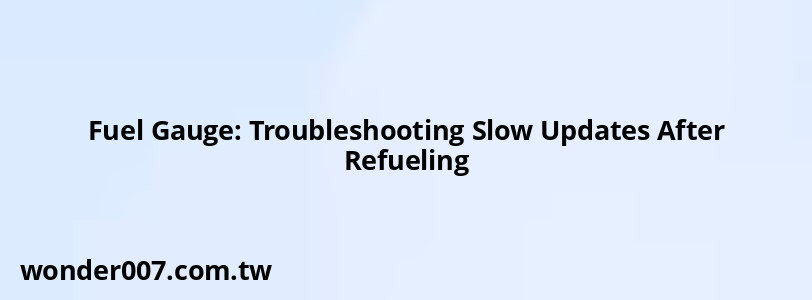Fuel Gauge: Troubleshooting Slow Updates After Refueling

Experiencing a slow update of your fuel gauge after refueling can be frustrating and may raise concerns about the accuracy of your vehicle's fuel system. This issue is common among various car models and can stem from several factors related to the fuel gauge mechanism, the fuel sender, or even electronic systems in the vehicle. Understanding the causes and potential solutions can help you address this problem effectively.
Common Causes of Slow Fuel Gauge Updates
The delay in your fuel gauge reflecting a full tank after refueling can be attributed to several reasons:
- Fuel Sender Malfunction: The fuel sender unit, which measures the amount of fuel in the tank, may be malfunctioning. If the float arm is stuck or worn out, it can lead to delayed readings.
- Anti-Slosh Feature: Many vehicles have an anti-slosh feature that prevents the gauge from fluctuating due to movement while driving. This feature may cause the gauge to take longer to register a full tank after refueling.
- Electrical Issues: Corroded wiring or faulty connections between the fuel sender and the gauge can lead to inaccurate readings.
- Calibration Issues: Sometimes, the gauge may need recalibration, especially if it has been reset or if there have been recent electrical issues.
What You Can Do
If your fuel gauge is slow to update after refueling, consider these steps:
- Check for Ignition State: Ensure that your vehicle is completely powered down during refueling. Some vehicles require that the ignition is off for the fuel gauge to register correctly.
- Inspect Fuel Sender: If you feel comfortable doing so, inspect the fuel sender for any signs of wear or damage. A stuck float can often be resolved by gently moving it.
- Resetting the System: Disconnecting the battery for a short period may reset the vehicle’s computer system and could recalibrate the gauge.
- Regular Maintenance: Keep up with regular maintenance checks on your vehicle’s electrical systems and sensors to prevent issues from arising.
When to Seek Professional Help
If you’ve tried these troubleshooting steps and your fuel gauge still fails to update promptly after refueling, it might be time to consult a professional mechanic. They can perform a thorough diagnostic check on:
- The fuel sender unit
- Electrical connections
- The vehicle's onboard computer for potential software updates
FAQs About Fuel Gauge Issues
FAQs About Fuel Gauge Slow Updates
- Why does my fuel gauge take time to show full after refueling?
This is often due to the anti-slosh feature in many vehicles designed to prevent fluctuations in readings. - Can I fix a slow fuel gauge myself?
Yes, simple checks like ensuring the ignition is off during refueling or inspecting the fuel sender can help. - When should I consult a mechanic?
If basic troubleshooting does not resolve the issue, or if you suspect a more serious problem with electrical systems or sensors.
Understanding these aspects of your vehicle's fuel gauge system can help you diagnose and potentially resolve issues with slow updates after refueling. Regular maintenance and timely intervention are key to keeping your vehicle running smoothly.
Related Posts
-
Honda Ridgeline Alarm: Troubleshooting Common Issues
30-01-2025 • 242 views -
2012 Ford F150 Radio Troubleshooting Guide
27-01-2025 • 208 views -
Check Fuel Cap: Troubleshooting Your Honda Odyssey
26-01-2025 • 359 views -
Jeep Grand Cherokee Won't Start: Troubleshooting Guide
28-01-2025 • 262 views -
Fuel Pump for 1994 Chevy 1500: Replacement Guide
29-01-2025 • 297 views
Latest Posts
-
Are O2 Sensors Covered Under Warranty
01-02-2025 • 505 views -
Power Steering Fluid Leak On Passenger Side
01-02-2025 • 590 views -
Rear Brake Caliper Piston Won't Compress
01-02-2025 • 469 views -
2015 Chevy Traverse AC Recharge Port Location
01-02-2025 • 539 views -
How To Turn Off Paddle Shifters Mercedes
01-02-2025 • 515 views
Popular Posts
-
BMW X5: Fuel Tank Capacity and Specifications
28-01-2025 • 803 views -
Toyota Hiace: Fuel Efficiency Insights for 2025
26-01-2025 • 863 views -
V12 Engine Costs: What You Need to Know
26-01-2025 • 834 views -
EPC Light: Understanding Causes and Solutions
26-01-2025 • 1195 views -
Hino Warning Lights: Understanding Dashboard Alerts
26-01-2025 • 1024 views
